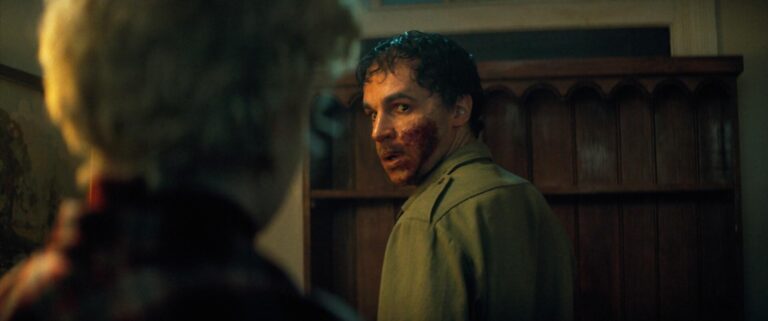Wolf Man (2024 | USA | 103 minutes | Leigh Whannell)
When director Leigh Whannell was tapped by Universal Pictures a few years ago to helm a reboot of The Invisible Man, he managed that rare hat trick of legitimately revitalizing a dusty vintage IP. The movie wound up becoming one of the last critical and box office hits of 2020 prior to the COVID pandemic.
Now Whannell’s followed that up with a second reboot of a classic Universal Pictures movie monster, Wolf Man. And the opening setpiece of Whannell’s latest monster movie portends a likewise canny, fiercely effective update.
Sometime in the early 1990s, survivalist Grady Lovell (Sam Jaeger) is hunting deer with his young son Blake (Zac Chandler) deep in the Oregon woods. Soon, menacing growls emerge from the forest, and a shadowy figure begins chasing father and son. Both take hasty refuge in a deer blind, hunkered down as the unseen beast’s condensed breath floats just over the deer blind’s walls. The creature just out of view, as it turns out, just might be a werewolf. It’s one of the most masterful opening sequences a modern horror movie’s offered in the last five years—elegant in its fairy-tale beauty yet mercilessly, effectively tense.
If the rest of the movie maintained that high-wire act, it’d be cause for celebration. Unfortunately the other 90-odd minutes of Wolf Man fail to keep up the momentum, despite a few fresh spins on the mythos and a surplus of quality ingredients.
After that knockout of an intro, Wolf Man flashes forward to the present day. The adult Blake (Christopher Abbott), now a parent himself, heads back into the Oregon woods to visit the childhood home he’s inherited from his long-estranged (and now legally dead) father. Charlotte, his wife (Julia Garner), and their daughter Ginger (Matilda Firth) join him. En route to the old Lovell farmhouse, Blake swerves the family’s rental truck to avoid striking a familiar, terrifying figure in front of them. After crashing the vehicle, the family’s beset by that figure—a werewolf. Amidst their escape, Blake’s scratched by the lycanthrope. And if you’re remotely familiar with the accompanying lore, you know what comes next.
Whannell has stated that he approached Wolf Man with the same revisionist spirit he lent to The Invisible Man, and he introduces some genuinely inspired wrinkles and twists on the werewolf myth. If The Invisible Man stared head-on at domestic abuse and the concurrent rising tide of #MeToo, Wolf Man feels for all the world like Whannell’s examination of love (and death) in the shadow of COVID. Blake’s transformation from man to werewolf eschews the traditional snout-growing and fur-sprouting, turning lycanthropy into a literal disease that ravages his skin, induces his hair to fall out, and assaults his physique with agonizing contortions. The look of the resulting creature design may not be nearly as iconic as, say, An American Werewolf in London, but it’s genuinely creepy and unsettling. Best of all, Blake’s rapid slide into lycanthropy is represented in striking audio-visual fashion as his POV morphs his family into infra-red lit prey, and their words gradually become unintelligible gibberish to his lupine ears.
Whannell merits some props for paying open homage to some certifiably classic predecessors. The encroaching atmosphere of grotesque sickness and decay owes more than a little to David Cronenberg’s body horror-informed filmography, specifically and most obviously The Fly. And The Thing’s eye-popping assemblage of practical effects has definitely informed Whannell’s immense fondness for over over-the-top goo, pus, and agonizing transformation.
It helps that Abbott turns out to be an inspired choice in the lead. In contrast to the unlikable but compulsively watchable jerks and heavies he’s customarily played in the past, his Blake feels like a genuinely sweet, introspective father trying not to pass his childhood trauma on to his child. The chemistry between him and Firth, while a little heavy-handed, creates a dynamic that registers as honest and real—Whannell’s wife Corbett Tuck co-wrote the screenplay with him, and it’s tempting to credit her for the connective emotional tissue here. The character of Charlotte, alas, receives little motivation and even less definition, so it’s hard to muster up any concern for the fragility of the couple’s marriage. Garner tries, but she’s saddled with the burden of trying to generate empathy on the skimpiest of character-development breadcrumbs.
The one-dimensional nature of a key character stands as just one of a number of flaws in the system here. There’s a twist that comes about halfway through that’s telegraphed a mile away, and though it’s not entirely implausible in this film’s pocket universe, it leans into monster movie cheesiness enough to offset the groundedness Whannell and company work to achieve in the movie’s first act. And with most of the film set in real-ish time over the course of one night in the wilderness, dark atmospherics unfortunately yield to plain old visual murkiness (in at least one scene, it’s impossible to make out a key detail that ultimately needs to be contextualized after the fact).
But Wolf Man‘s chief stumble occurs in its final reel. Whannell’s and Tuck’s screenplay reaches for the doomed romantic notes of The Fly, but there’s precious little sense of connection or history between the ostensible romantic leads here. And ironically, Abbott’s vulnerability and sweetness become a liability plot-wise (this falls more on the script and direction than Abbott’s work). Never once, not even in the most extreme throes of his werewolfery, is there a sense that Blake could harm his daughter or wife. That sense of unpredictability and danger thrums through the best tragic monster movies, from The Fly all the way back to the quaint antiquity of the 1941 Wolf Man–will love be enough to save someone from the monster that their loved one’s become? With the outside threat dispensed by then, and the sense of jeopardy (pardon the pun) defanged, this ostensibly scary ravenous werewolf comes off more like a docile, if sorta creepily deformed, puppy.
Wolf Man opens in theaters everywhere Friday, January 17.




